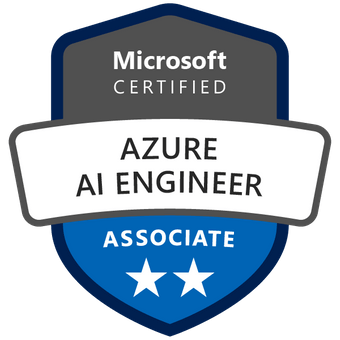
Course Description
AI-102 Designing and Implementing an Azure AI Solution is intended for software developers wanting to build AI infused applications that leverage Azure Cognitive Services, Azure Cognitive Search, and Microsoft Bot Framework. The course will use C# or Python as the programming language.
Who Should Attend?
Software engineers concerned with building, managing and deploying AI solutions that leverage Azure Cognitive Services, Azure Cognitive Search, and Microsoft Bot Framework. They are familiar with C# or Python and have knowledge on using REST-based APIs to build computer vision, language analysis, knowledge mining, intelligent search, and conversational AI solutions on Azure.
About this course
Course Outline
-
Plan and manage an Azure AI solution (25–30%)
-
Implement image and video processing solutions (15–20%)
-
Implement natural language processing solutions (25–30%)
-
Implement knowledge mining solutions (5–10%)
-
Implement conversational AI solutions (15–20%)
-
Select the appropriate service for a vision solution
-
Select the appropriate service for a language analysis solution
-
Select the appropriate service for a decision support solution
-
Select the appropriate service for a speech solution
-
Select the appropriate Applied AI services
-
Manage account keys
-
Manage authentication for a resource
-
Secure services by using Azure Virtual Networks
-
Plan for a solution that meets Responsible AI principles
-
Create an Azure AI resource
-
Configure diagnostic logging
-
Manage costs for Azure AI services
-
Monitor an Azure AI resource
-
Determine a default endpoint for a service
-
Create a resource by using the Azure portal
-
Integrate Azure AI services into a continuous integration/continuous deployment (CI/CD) pipeline
-
Plan a container deployment
-
Implement prebuilt containers in a connected environment
-
Create a solution that uses Anomaly Detector, part of Cognitive Services
-
Create a solution that uses Azure Content Moderator, part of Cognitive Services
-
Create a solution that uses Personalizer, part of Cognitive Services
-
Create a solution that uses Azure Metrics Advisor, part of Azure Applied AI Services
-
Create a solution that uses Azure Immersive Reader, part of Azure Applied AI Services
-
Select appropriate visual features to meet image processing requirements
-
Create an image processing request to include appropriate image analysis features
-
Interpret image processing responses
-
Extract text from images or PDFs by using the Computer Vision service
-
Convert handwritten text by using the Computer Vision service
-
Extract information using prebuilt models in Azure Form Recognizer
-
Build and optimize a custom model for Azure Form Recognizer
Implement image classification and object detection by using the Custom Vision service, part of Azure Cognitive Services
-
Choose between image classification and object detection models
-
Specify model configuration options, including category, version, and compact
-
Label images
-
Train custom image models, including classifiers and detectors
-
Manage training iterations
-
Evaluate model metrics
-
Publish a trained iteration of a model
-
Export a model to run on a specific target
-
Implement a Custom Vision model as a Docker container
-
Interpret model responses
-
Process a video by using Azure Video Indexer
-
Extract insights from a video or live stream by using Azure Video Indexer
-
Implement content moderation by using Azure Video Indexer
-
Integrate a custom language model into Azure Video Indexer
-
Retrieve and process key phrases
-
Retrieve and process entities
-
Retrieve and process sentiment
-
Detect the language used in text
-
Detect personally identifiable information (PII)
-
Implement and customize text-to-speech
-
Implement and customize speech-to-text
-
Improve text-to-speech by using SSML and Custom Neural Voice
-
Improve speech-to-text by using phrase lists and Custom Speech
-
Implement intent recognition
-
Implement keyword recognition
-
Translate text and documents by using the Translator service
-
Implement custom translation, including training, improving, and publishing a custom model
-
Translate speech-to-speech by using the Speech service
-
Translate speech-to-text by using the Speech service
-
Translate to multiple languages simultaneously
-
Create intents and add utterances
-
Create entities
-
Train evaluate, deploy, and test a language understanding model
-
Optimize a Language Understanding (LUIS) model
-
Integrate multiple language service models by using Orchestrator
-
Import and export language understanding models
-
Create a question answering project
-
Add question-and-answer pairs manually
-
Import sources
-
Train and test a knowledge base
-
Publish a knowledge base
-
Create a multi-turn conversation
-
Add alternate phrasing
-
Add chit-chat to a knowledge base
-
Export a knowledge base
-
Create a multi-language question answering solution
-
Create a multi-domain question answering solution
-
Use metadata for question-and-answer pairs
-
Provision a Cognitive Search resource
-
Create data sources
-
Define an index
-
Create and run an indexer
-
Query an index, including syntax, sorting, filtering, and wildcards
-
Manage knowledge store projections, including file, object, and table projections
-
Attach a Cognitive Services account to a skillset
-
Select and include built-in skills for documents
-
Implement custom skills and include them in a skillset
-
Implement incremental enrichment
-
Design conversational logic for a bot
-
Choose appropriate activity handlers, dialogs or topics, triggers, and state handling for a bot
-
Create a bot from a template
-
Create a bot from scratch
-
Implement activity handlers, dialogs or topics, and triggers
-
Implement channel-specific logic
-
Implement Adaptive Cards
-
Implement multi-language support in a bot
-
Implement multi-step conversations
-
Manage state for a bot
-
Integrate Cognitive Services into a bot, including question answering, language understanding, and Speech service
-
Test a bot using the Bot Framework Emulator or the Power Virtual Agents web app
-
Test a bot in a channel-specific environment
-
Troubleshoot a conversational bot
-
Deploy bot logic
Prerequisites
Before attending this course, students must have:
-
Knowledge of Microsoft Azure and ability to navigate the Azure portal
-
Knowledge of either C# or Python
-
Familiarity with JSON and REST programming semantics
Where
This will be a virtual event hosted on Microsoft Teams. In the Microsoft Teams platform and sessions, your name, email address, or title may be viewable by other participants. By joining this event, you agree to this experience.
Duration
4 days
